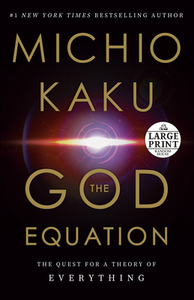Take a photo of a barcode or cover
informative
fast-paced
challenging
informative
reflective
Well written and easily digestible, many of the explanations were perfect in communicating complex concepts. I disagreed with some of his conclusions on the implications of certain aspects of string theory, but his conclusions were nonetheless sound.
What's this book for? Who is it for? I'm not sure. I think it's more interesting and entertaining than it is educational; Michio Kaku's writing is so big picture and so accessible that you don't really have the option of leaving with an applicable understanding of any of his subject matter. But that's clearly not what he's going for. Maybe the reader leaves with a firm but hazily supported notion that science is beautiful, that physics is useful and cool. I'm pretty okay with that.
Ultimately this is a concise, well crafted book. I appreciated the parting thoughts on why and how a unifying theory might matter.
Ultimately this is a concise, well crafted book. I appreciated the parting thoughts on why and how a unifying theory might matter.
challenging
informative
inspiring
reflective
slow-paced
informative
medium-paced
It's written in a pretty easy to understand way.
challenging
informative
inspiring
reflective
medium-paced
While not the best popular science book I have ever read, I enjoyed The God Equation. It's a very digestible and relatively short (about 200 pages) book about the quest to link the theory of relativity with the quantum theory. The author of the book Michio Kaku is obviously heavily invested in string theory (being one of the co-founders) but I was surprised to find that the book takes its sweet time before finally reaching the topic of string theory towards the end. This was probably a benefit to me as I actually quite enjoyed the philosophical and wandering feeling of the book as it explored the history for the hunt of this ultimate theory and the beliefs and insights that tie all of this together. Kaku has a nice understanding of the human implications for these questions and discoveries as they relate to purpose and meaning. If the book fails it is simply because it falls in sort of an odd spot for me. Obviously you will not be able to grasp the mathematics or even fully understand string and other theories just from reading this book. But neither does it provide a largely satisfying big picture view from a layman's perspective. I think this book is worth reading if you have zero introduction to string theory and are curious but don't really need to invest in a massive amount of texts to have a brief (very brief!) understanding.
challenging
informative
inspiring
medium-paced
A lot of this material is recycled from this other books—the same structure, the same anecdotes, the same intellectual questions he's trying to answer. I can't blame him if he wants to make that coin but I can't say that it makes me want to read any more of these books if nothing differentiates one from the other.
He is also still rather opaque about some issues, and I find that Kaku makes some really wild claims without explaining either 1) the relevance or 2) the process of how it can be done. One particular "WTF???" moment for me was his casual, almost throwaway comment about how scientists are currently assembling machines that can detect energy? waves? something that our universe gave off in its infancy when it collided with a parallel universe. And then he moved on just like that. I was reeling. How? What? What is the basis of this machine? What is it detecting? How is it detecting? Where are they pointing it? What??? I was just. Floored. And he moved on. It was the worst cliffhanger I've read in a long time.
He is also still rather opaque about some issues, and I find that Kaku makes some really wild claims without explaining either 1) the relevance or 2) the process of how it can be done. One particular "WTF???" moment for me was his casual, almost throwaway comment about how scientists are currently assembling machines that can detect energy? waves? something that our universe gave off in its infancy when it collided with a parallel universe. And then he moved on just like that. I was reeling. How? What? What is the basis of this machine? What is it detecting? How is it detecting? Where are they pointing it? What??? I was just. Floored. And he moved on. It was the worst cliffhanger I've read in a long time.

